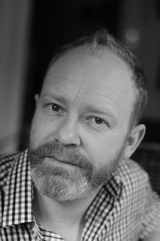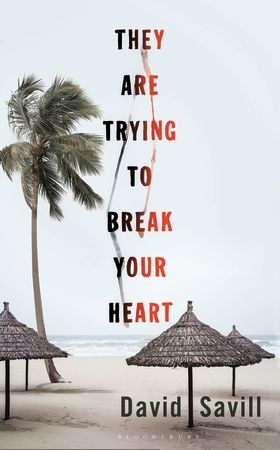David Savill - author of They Are Trying To Break Your Heart - debunks those phrases so often heard in creative writing classes across the world in 'Five Lies Creative Writing Teachers Tell'.

1) ‘Write What You Know’
Because Don DeLillo was in fact Lee Harvey Oswald, Kurt Vonnegut was visited by time-travelling aliens, Patricia Highsmith was a serial killer and JK Rowling a wizard…see where this is going? Writing students, especially those engaged in fantasy, crime and science fiction, can get hot under the collar when a tutor tells them to ‘write what you know’. The fault lies with the tutor who doesn’t explain the advice, or worse, doesn’t understand it. A writer is not bound to rehearse the events of their life (thank goodness, leading a quiet life can be an occupational hazard for individuals chained to their desks). But the stories you invent originate with your own psychological experiences, however hard you may try to escape them. Don DeLillo is a serious reader of American history and JFK’s death impacted his formative years, Vonnegut’s wild writing strategies were informed by existential trauma, Patricia Highsmith was by most accounts a very dark-minded, hedonistic, and guilt-ridden woman, while JK Rowling’s passion is the golden age of children’s literature and, she happened to write her Potter novels while experiencing the trials of single-motherhood. Whether you are Lee Child or Iris Murdoch, all writing contains a kernel of catharsis. The good tutor will get to know you, and encourage work which is attentive to your experiences. She will also help you explore what you want to know, as much as what you think you know.
2) ‘Write Every Day’
This is a whopper, not least because I know so many tutors who fail the standard themselves. So why do we say it? Zeal perhaps, or a fear of lazy students. If you have the luxury of time and happen to be in the white-heat of a novel or story, you probably won’t be able to stop yourself writing every day. But the reality is, most of us struggle to find writing time, and making a student writer feel guilty for not writing every day can be counter-productive. It works for some, but not for many. Reading and thinking are equally important to process, and sometimes a little research and thought can save you a lot of wasted words. Don’t write every day, but be a writer every day.
3) ‘Harlen Coben is a bad writer’
Why do creative writing tutors tell you someone is a bad writer when the bad writer in question has sold millions of copies, and quite certainly a million more than your tutor ever will? Personal taste, envy, cultural snobbery? Your writing tutor is human, and certainly possesses one or more of these qualities. The place of Creative Writing in academia has also created a breed of writer-tutors who feel it their duty to uphold certain literary standards. But a good tutor reads widely, and with you in mind. Personally, I can’t bear to read Harlen Coben when I could be reading Michael Connelly, and I’d rather be reading Georges Simenon than either of them. But if I get a student who looks like they could give Coben a run for his very substantial money, then I’m not going to keep suggesting she write like Simenon. We’re going to sit down and think about why people actually like Coben, and what it is he provides them with. On a technical level, it is possible to understand why Coben’s writing is bad, but the fact is, he creates a consistent fictional universe his readers want to inhabit. If you have a similar talent, it is your writing tutor’s duty to nurture it.

4) 'Show, Don’t Tell’
It is the one piece of advice everyone knows about Creative Writing. But over-emphasis and repetition by those who don’t study the subject has distorted the lesson. All prose and poetry is a balance of showing and telling. In poetry, Imagists took the concrete noun to an extreme. But study Auden or Rilke, and you’ll find a lot of powerful and telling abstraction. In prose, writers like Roth and Murdoch, are masters of telling exposition, while Hemingway and Highsmith might be studied for their ability to relate a story through the visual world of action. More often, satisfying writing achieves a fine balance. Student writers are likely to hear their tutor ask for more showing than they are to hear them ask for more telling, because beginner writers underestimate the power of simply stated action and description, or just lack confidence in the intrinsic interest of well-made observations. But ‘show, don’t tell’, is not a truism, or general rule; the tutor who construes it as one, is lying through ignorance.
5) Don’t listen to a writer who hasn’t published
I have to attend to this one because it speaks to a fundamental misconception about the study of Creative Writing: the notion that the discipline is entirely aimed at producing published writers. Some of my best tutors did not publish, or self-published, or struggled to publish. Creative Writing can take the form of prison workshops, undergraduate degrees, holiday retreats, one-to-one mentoring, publisher-run short courses and therapeutic retreats. Creative Writing is the use of writing as an exploration of self in relation to other, the development of critical faculties, the growth of personality, and even the promotion of professional and civilised behaviour. Some tutors will not have made use of all its ends, narrowly focusing on a particular medium or commercial goal; others will not have brought a writer to publication, but may have helped a criminal deal with his traumatic childhood, or an undergraduate learn how to read critically. Some of the worst tutors are published writers, and so are some of the best. Make sure you understand why you want to study creative writing, and find a course and tutor who can meet your expectations.
David Savill is the author of They Are Trying To Break Your Heart (Bloomsbury, April 2016). He is the Programme Director of the St Mary's University Creative Writing MA, and a former BBC Current Affairs producer. He tweets @SavillDavid and blogs at david.savill.com
Comments